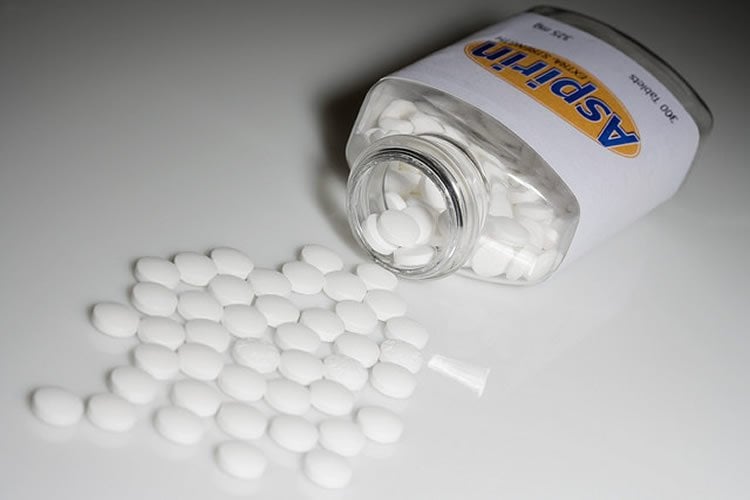Summary: Researchers say the popular over the counter medication Aspirin could help reduce Alzheimer’s related amyloid plaques.
Source: Rush University Medical Center.
A regimen of low-dose aspirin potentially may reduce plaques in the brain, which will reduce Alzheimer’s disease pathology and protect memory, according to neurological researchers at Rush University Medical Center, who published the results of their study today in the July issue of The Journal of Neuroscience.
“The results of our study identifies a possible new role for one of the most widely used, common, over-the-counter medications in the world,” said Kalipada Pahan, PhD, the study’s senior author and lead research investigator, who also is the Floyd A. Davis, MD, Endowed Chair of Neurology and professor of neurological sciences, biochemistry and pharmacology in Rush Medical College.
Alzheimer’s disease is a fatal form of dementia that affects up to 1 in 10 Americans age 65 or older. To date, the FDA has approved very few drugs for the treatment of Alzheimer’s disease-related dementia and the medications that exist can only provide limited symptomatic relief.
The exact cause of Alzheimer’s disease progression is unknown; however, poor disposal of the toxic protein amyloid beta in the brain is a leading mechanism in dementia and memory loss.
Activating the cellular machinery responsible for removing waste from the brain therefore has emerged as a promising strategy for slowing Alzheimer’s disease.
Amyloid beta forms clumps called amyloid plaques, which harm connections between nerve cells and are one of the major signs of Alzheimer’s disease. Building on previous studies demonstrating a link between aspirin and reduced risk and prevalence of Alzheimer’s disease,
Pahan and his colleagues were able to show that aspirin decreases amyloid plaque pathology in mice by stimulating lysosomes — the component of animal cells that help clear cellular debris.
“Understanding how plaques are cleared is important to developing effective drugs that stop the progression of Alzheimer’s disease,” said Pahan.
A protein called TFEB is considered the master regulator of waste removal. The researchers gave aspirin orally for a month to genetically modified mice with Alzheimer’s pathology, then evaluated the amount of amyloid plaque in the parts of the brain affected most by Alzheimer’s disease.

They found that the aspirin medications augmented TFEB, stimulated lysosomes and decreased amyloid plaque pathology in the mice.
“This research study adds another potential benefit to aspirin’s already established uses for pain relief and for the treatment of cardiovascular diseases,” said Pahan. “More research needs to be completed, but the findings of our study has major potential implications for the therapeutic use of aspirin in AD and other dementia-related illnesses.”
Other researchers involved in this study are Sujyoti Chandra, a biochemistry graduate student at Rush, and Malabendu Jana, PhD, assistant professor of neurological sciences at Rush.
Funding: The study was funded by the U.S. Department of Veteran Affairs, the Alzheimer’s Association and the National Institutes of Health.
Source: Deb Song – Rush University Medical Center
Publisher: Organized by NeuroscienceNews.com.
Image Source: NeuroscienceNews.com image is credited to Oregon State University. Licensed CC BY NC SA 2.0.
Original Research: Abstract for “Aspirin induces Lysosomal biogenesis and attenuates Amyloid plaque pathology in a mouse model of Alzheimer’s disease via PPARα” by Sujyoti Chandra, Malabendu Jana and Kalipada Pahan in Journal of Neuroscience. Published July 2 2028.
doi:10.1523/JNEUROSCI.0054-18.2018
[cbtabs][cbtab title=”MLA”]Rush University Medical Center”Could Aspirin Help Treat Alzheimer’s?.” NeuroscienceNews. NeuroscienceNews, 2 July 2028.
<https://neurosciencenews.com/alzheimers-aspirin-9495/>.[/cbtab][cbtab title=”APA”]Rush University Medical Center(2028, July 2). Could Aspirin Help Treat Alzheimer’s?. NeuroscienceNews. Retrieved July 2, 2028 from https://neurosciencenews.com/alzheimers-aspirin-9495/[/cbtab][cbtab title=”Chicago”]Rush University Medical Center”Could Aspirin Help Treat Alzheimer’s?.” https://neurosciencenews.com/alzheimers-aspirin-9495/ (accessed July 2, 2028).[/cbtab][/cbtabs]
Abstract
Mindfulness-Based Cognitive Therapy for Chronic Tinnitus: Evaluation of Benefits in a Large Sample of Patients Attending a Tinnitus Clinic
Lysosomes play a central role in cellular homeostasis by regulating the cellular degradative machinery. Since aberrant lysosomal function has been associated with multiple lysosomal storage and neurodegenerative disorders, enhancement of lysosomal clearance has emerged as an attractive therapeutic strategy. Transcription factor EB (TFEB) is known as a master regulator of lysosomal biogenesis and here, we describe that aspirin, one of the most widely-used medications in the world, upregulates TFEB and increases lysosomal biogenesis in brain cells. Interestingly, aspirin induced the activation of peroxisome proliferator-activated receptor α (PPARα) and stimulated the transcription of Tfeb via PPARα. Finally, oral administration of low dose of aspirin decreased amyloid plaque pathology in both male and female 5XFAD mice in PPARα-dependent fashion. This study delineates a new function of aspirin in stimulating lysosomal biogenesis via PPARα, and suggests that low-dose aspirin may be used in lowering storage materials in AD as well as lysosomal storage disorders.
Significance statement:
Developing drugs for the reduction of amyloid beta containing senile plaque, one of the pathological hallmarks of Alzheimer’s disease (AD), is an important area of research. Aspirin, one of the most widely-used medications in the world, activates peroxisome proliferator-activated receptor α (PPARα) to upregulate TFEB and increase lysosomal biogenesis in brain cells. Accordingly, low-dose aspirin decreases cerebral plaque load in a mouse model of Alzheimer’s disease via PPARα. These results delineate a new mode of action of aspirin, which may be beneficial for AD as well as lysosomal storage disorders.






